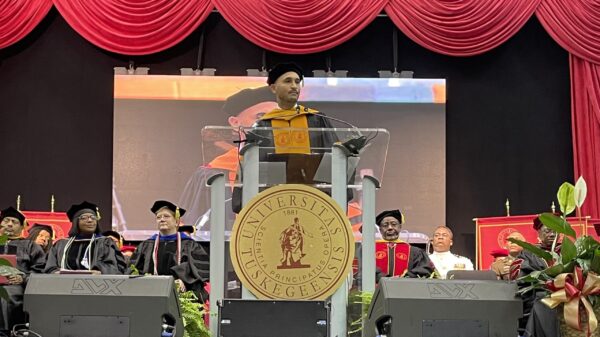The Alabama House of Representatives is expected to consider the 2022 education budget on Tuesday. The Education Trust Fund budget package is seven bills that collectively fund education in Alabama. The 2022 budget is from Oct. 1 of each fiscal year through Sept. 30.
The 2022 education budget is $7.65 billion and the largest in state history.
This year’s budget includes a 2 percent across-the-board pay raise. Due to fears about the COVID-19 shutdown, there was no pay raise last year. Senate Bill 188 is the bill authorizing that all public education employees, including K-12, postsecondary education, and AIDB receive the salary increase.
The state Legislature is concerned both by both some systems’ difficulty in finding qualified applicants and by declining enrollment in the state’s teacher colleges. SB188 is sponsored by state Sen. Donnie Chesteen, R-Dothan, and carried in the House by state Rep. Bill Poole, R-Tuscaloosa, who chairs the House Ways and Means Committee, tasked with making sure that the education budget contains House priorities.
Senate Bill 327 is the substantially beefed-up salary schedule for teachers who teach math and science. These are positions that many school systems, particularly rural and inner-city, struggle to staff adequately.
Many students across Alabama are being taught math and science by a teacher who is not certified for that. In some cases, they are being taught by a teacher’s aide, who may not even have a four-year degree. Pre-COVID-19 pandemic testing showed consistently that Alabama students are at the bottom of the country in math and science.
To address that issue, the Legislature is beefing up the teachers’ salary schedule and giving additional compensation to highly qualified math and science teachers, particularly the step increases that such teachers receive in order to retain those teachers mid-career.
SB327 is sponsored by Sen. Arthur Orr, R-Decatur and carried in the House by Chairman Poole. Orr is the Chairman of the Senate Finance and Taxation Education Committee that is tasked with writing the initial budget legislation, which begins in the state Senate.
Senate Bill 193 is a supplemental appropriations bill for the current fiscal year ending on Sept. 30, 2021. This is money from the Education Trust Fund Advancement and Technology Fund, which is a reserve fund that was beefed up last year due to concerns about how the COVID-19 pandemic would affect the current year’s revenues.
The pandemic has not hurt the economy and state revenues nearly as bad as the Legislature thought it would, so that money is being released to various school systems and colleges and universities, as well as other entities funded by state education dollars.
Higher education will receive $76,336,095. More specifically the Alabama Community College System will receive $27,200,789, Alabama A&M University $1,680,382, Alabama State University $1,210,536, University of Alabama $9,260,887, the University of Alabama Birmingham $6,329,438, University of Alabama Huntsville $2,989,723. Athens State University $1,001,097, Auburn University $8,188,295, Auburn University Montgomery $1,702,996, Jacksonville State University $2,888,482, University of Montevallo $826,797, University of North Alabama $2,336,879, University of South Alabama $4,017,087, Troy University $4,659,145, Tuskegee University $278,293, and the University of West Alabama $1,765,271. The various K-12 school systems receive $205,971,947, with $2 million of that going to Teacher Professional Development.
The rolling reserve system implemented by then-state Rep. Greg Canfield in 2011 has allowed the state to avoid the crippling prorations that the education community used to suffer almost every year when the Legislature would take money that had been budgeted to the schools back from them halfway through the current fiscal year. SB193 is sponsored by Orr and carried in the House by Poole.
Senate Bill 190 is a supplemental appropriation for the current fiscal year from the Education Trust Fund. These are revenues that the state has received beyond what the conservative budgeting of the legislature had predicted in their projections last year. Some of this money is tax revenues the legislature did not expect and part of it is federal coronavirus aid dollars received from the federal government.
This supplemental appropriation allocates money to the Alabama Institute for the Deaf and Blind, the Educational Television Commission, the Marine Environmental Sciences Consortium, Tuskegee University, Athens State University, University of West Alabama, the University of South Alabama, the University of North Alabama, Alabama Community College System, the State Department of Education, the Commission on Higher Education, the Alabama Historical Commission, the Department of Archives and History, the Department of the Examiners of Public Accounts, and the Education Trust Fund Advancement and Technology Fund (the reserve fund mentioned previously), and makes a transfer from the Education Trust Fund to the Budget Stabilization Fund.
The allocation of state dollars to city and county school systems is made based on enrollment and attendance data collected in September. The Budget Stabilization Fund will be used to protect school systems from losing teacher units in 2022 based on erroneous attendance data due to the ongoing COVID-19 pandemic. SB190 is sponsored by Sen. Jim McClendon, R-Springville, and carried in the House by Poole.
Senate Bill 192 is an appropriations bill for historic Talladega College. Technically non-state schools may not receive an appropriation from the Education Trust Fund budget; so those schools receive their appropriation in a separate bill. Talladega College receives $1,003,956. SB192 is sponsored by Sen. Tom Whatley, R-Auburn, and carried in the House by Poole.
Senate Bill 191 is the state appropriations bill for Southern Preparatory Academy, formerly known as Lyman Ward Military Academy. Southern Prep. receives $389,327 in the 2022 budget year. SB191 is sponsored by Sen. Bill Beasley, D-Clayton, and carried in the House by Poole.
Senate Bill 185 is the state appropriation for Tuskegee University. Tuskegee University receives $12,257,156. Of that $2,000,000 is earmarked for the Alabama Agricultural Extension Service. SB185 is sponsored by Orr and carried in the House by Poole.
Senate Bill 189 is the actual education trust fund budget often abbreviated as ETF. It includes all appropriations for the support, maintenance, and development of public education in Alabama. SB189 is sponsored by Orr and carried in the House by Poole.
The total educational outlays in the 2022 budget package are $7,669,311,133. This is an increase of $451,888,646 from the 2021 education budget. The House substitute is $3,265,442 less than the version passed by the Senate but is still more than the governor’s budget request.
The K-12 system receives $5,252,917,289, higher education receives $1,956,935,352, and other state agencies receive $459,458,492. K-12 receives 68.49 percent while higher education receives 25.52 percent. Other agencies get 5.9 percent. See the budget spreadsheet for a complete breakdown of the 2022 education budget
If the budget is passed by the House on Tuesday, it must still go back to the Senate for them to have the option to concur with House changes to the budget. If the state Senate does not concur, then the education budget will go to a conference committee to draft a compromise budget. That budget would then have to be sent back to both houses for their concurrence with the conference committee before it could go to the governor for her consideration.
Alabama has an arcane budgeting system, where some money is earmarked to the Education Trust Fund and other dollars are earmarked for the state General Fund budget. There are billions of dollars that are outside of the budgeting process that go directly to the state agency that receives them. The biggest of these are fuel tax dollars earmarked by Road and Bridge Fund, which funds the Alabama Department of Transportation. The SGF has been passed by the House but is still in the Senate Finance and Taxation General Fund Committee. Preparing and passing the two budgets is the primary constitutional responsibility of the state Legislature.
Tuesday will be day 26 of the 2021 Legislative Session. The Alabama Constitution of 1901 allows only a maximum of 30 days in a regular session.













































